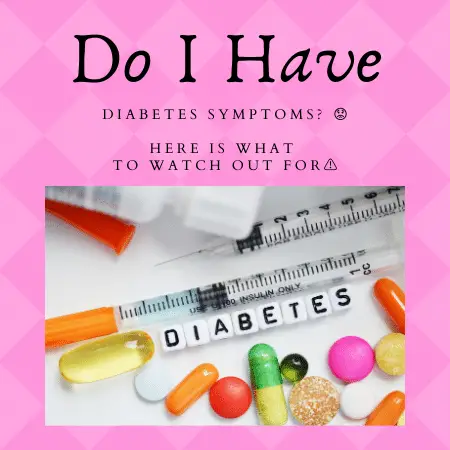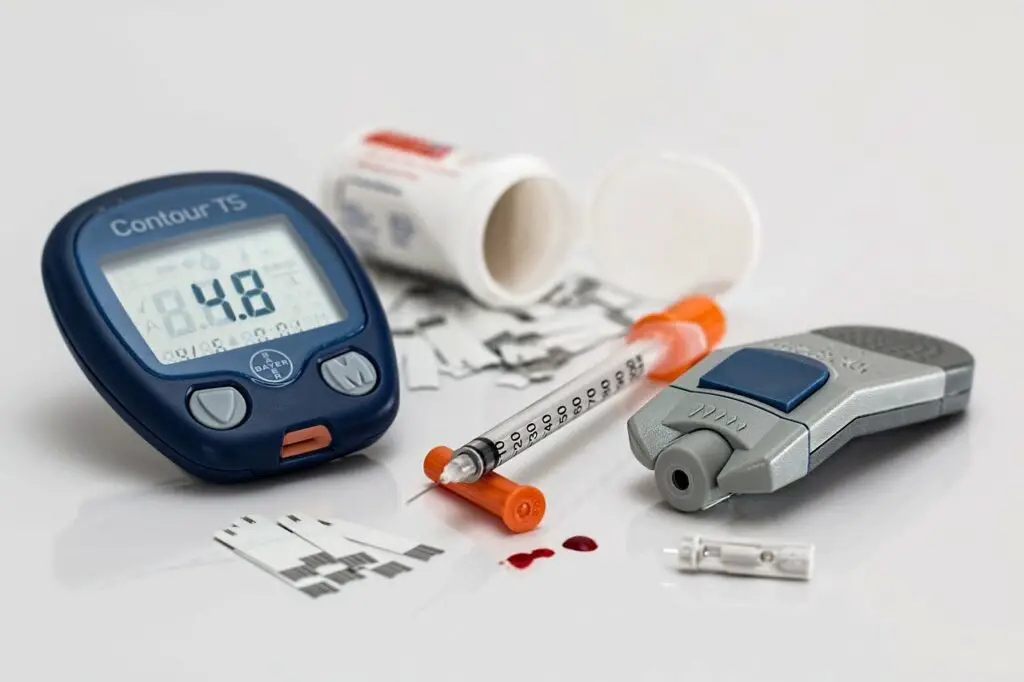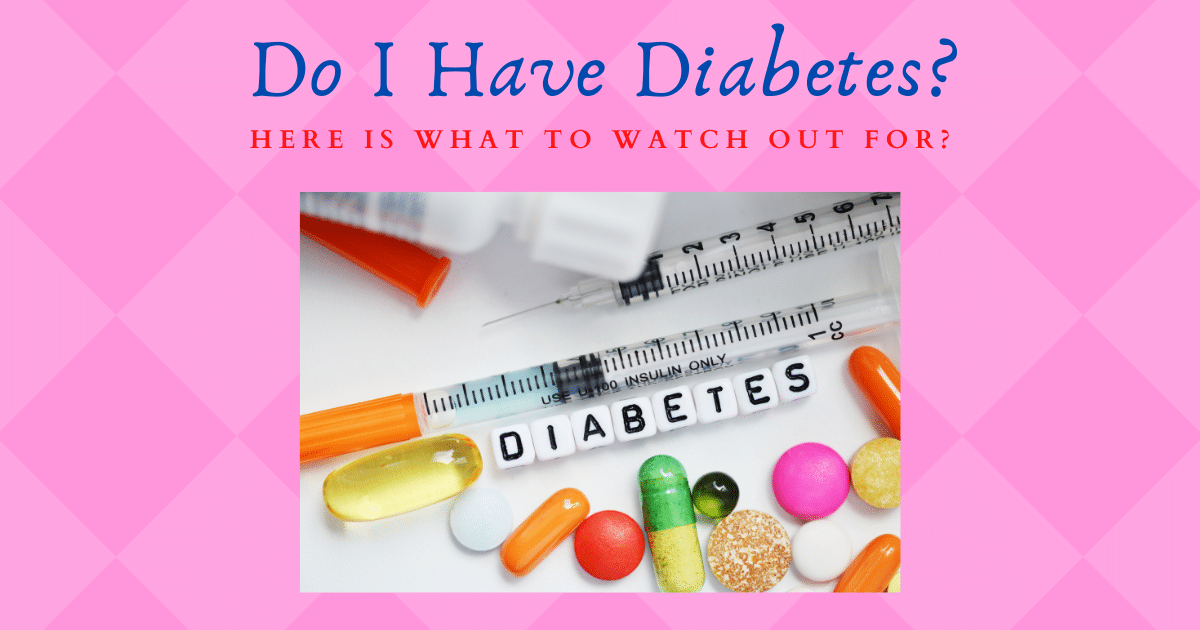Hello All, today we are going to look at Diabetes. Is this a question you find yourself asking? Do I Have Diabetes Symptoms? Here Is What To Watch Out For!! ? What are they? How does it affect you?
Sadly, there are an awful lot of people that have diabetes but don’t even know it. Indeed, this is not a very nice condition to have and what’s worse if left untreated it can be fatal ⚠
Scary I know and even more so it is increasingly common. so for this guide;
Do I Have Diabetes Symptoms?
Here Is What To Watch Out For!! ?

Here is What we will cover :
- What is Considered Prediabetes?
- What is Type 2 Diabetes
- What is Type 1 Diabetes
- Types of Gestational Diabetes
- Why do insulin Problems Happen
- Other Health Problems
- Diet and Exercise Advice
- My Final Thoughts
Do I Have Diabetes Symptoms?
Here Is What To Watch Out For!! ?

1.) What Is Considered Prediabetes
Prediabetes is a condition where your blood sugar levels are higher than normal. It is not high enough to be considered type 2 diabetes as yet, but if you don’t make changes then it can become type 2. (1)
How Is It Treated
- Eating a diet that is full of fibre
- Taking regular exercise
- losing weight
- You may be prescribed some medications
2.) What Is Type 2 Diabetes
Type 2 diabetes is a very common condition that causes the levels of sugar in the blood to become very high. It can also cause symptoms like extreme thirst, needing to urinate a lot more and feeling very tired. It can also cause very serious problems with your eyes, heart and nerves If left untreated. (4)
How can it be treated
certain people who have type 2 diabetes can reach their target blood sugar levels with just diet and exercise alone, but others may also require diabetes medications or insulin therapy. The decision about which medications are best depends on many factors, including your glucose level and any other related health problems you have.6)
3.) What Is Type 1 Diabetes
Type 1 diabetes, is known as juvenile diabetes because it is more common in children than type 2. It can also be called insulin-dependent diabetes. This is a chronic condition in which the pancreas produces little or no insulin. Insulin is a hormone needed by the body to allow sugar to enter the cells to produce energy. (5)
What is the treatment
- Using insulin, normally injections.
- Carbohydrate, fat and protein control
- Frequent blood sugar monitoring tests Carried out.
- Making sure to eat healthy foods.
- Exercising frequently and maintaining healthy body weight. (7)

4.) Types of Gestational Diabetes
Gestational diabetes occurs when you are pregnant, which means your blood sugar levels rise. It generally goes away once you have had your baby. (2)
If you suffer from it when you are pregnant you have more chance of contracting Type 2 in later life. (3)
How is it Treated
The treatment for gestational diabetes depends on your blood glucose levels. In a lot of people, gestational diabetes can be treated with lifestyle changes such as diet and exercise. In some cases, it may be necessary to take oral medication such as metformin (Glucophage, Glumetza) or insulin that you inject to lower your blood sugar levels.

5.) Why Do Insulin Problems Happen
Doctors are not sure what causes type 1 diabetes, what they do know is this :
Insulin allows the glucose from the food we eat to access the cells in their body to supply energy. Insulin resistance is usually a result of,
- People have genes or an environment that make it more likely that they are unable to make enough insulin to cover how much glucose they eat.
- The body makes Too much insulin to process the excess blood glucose.
- The pancreas is unable to keep up with the increased demands, and the excess blood sugar starts to circulate in the blood, causing damage.
- Over time, insulin becomes less effective at introducing glucose to cells, and blood sugar levels continue to rise.
In the case of type 2 diabetes, insulin resistance Is a gradual process. This is why doctors often recommend making lifestyle changes in an attempt to slow or reverse the condition. (8)
6.) Other Health Problems Linked To Diabetes
Unfortunately, if untreated diabetes can lead to several other negative health issues. These include the following;
- Strokes
- Kidney disease
- Nerve damage
- Trouble with your feet
- Heart disease
- Gum disease
- Eye issues and even blindness
7.) Diet and Exercise Advice
Eating a healthy diet high in nutritious foods, such as nuts, vegetables, whole grains, fruit, lean proteins and healthy fat sources.
- Avoiding high-sugar foods that provide empty calories, such as fizzy drinks, avoiding fried foods, and sugary desserts.
- Not drinking alcohol to excess or keeping the intake to less than one a day for women or two a day for men.
- Doing at least 30 minutes of exercise a day at least 5 days of the week, such as walking, skipping, riding a bicycle or swimming.
- Learning how to recognize the signs of low blood sugar when exercising, including dizziness, weakness, and intense sweating.
Slow and steady weight loss is more likely to help a person retain long-term benefits, which can help some people with type 2 diabetes manage the condition without the need for medication. (9)
My Final Thoughts
Having any form of diabetes can be very dangerous for the sufferer, if you think you may have some of the symptoms it’s imperative that you speak to a medical professional. Having a simple blood test can give you the answer.
With the exception of Type 1 diabetes which is irreversible, the other types can be controlled by diet, exercise and supplements development for this purpose.
I wish to thank you for reading this article, if you want to leave a comment or a question you can do so below, I love hearing from you and I will always reply back. If you know anyone else who would benefit from reading this then please feel free to share it.
Take great care of yourself because you are worth it.
Lisa.
This post may contain affiliate links, which means I may receive a small commission if you purchase anything. This helps to keep the work coming to you. The price you pay will not be affected.
Sources of information
Source (1) https://www.mayoclinic.org/diseases-conditions/prediabetes/symptoms-causes/syc-20355278
Source (2) https://www.nhs.uk/conditions/gestational-diabetes/
Source (3) https://www.marchofdimes.org/complications/gestational-diabetes.aspx
Source (4) https://www.nhs.uk/conditions/type-2-diabetes/
Source (5) https://www.mayoclinic.org/diseases-conditions/type-1-diabetes/symptoms-causes/syc-20353011
Source (6) https://www.mayoclinic.org/diseases-conditions/type-2-diabetes/diagnosis-treatment/drc-20351199
Source (7) https://www.mayoclinic.org/diseases-conditions/type-1-diabetes/diagnosis-treatment/drc-20353017
Sources (8 and 9) https://www.medicalnewstoday.com/articles/323627







As an online consumer and one who reads a lot, I found your article on Diabetes extremely helpful. I have type two, so I understand clearly your post.
It is very concise, as so many of your articles are. You make things so clear in lay terms.
The layout of your site, as a whole is very easy to navigate. I will happily recommend people to check out your site. Carson
Hi Carson,
I appreciate you stopping by and leaving a great comment, my mum has type 2 and my sister has pre diabetes, I had gestational. We will probably end up with type 2.
Thank you very much for the compliments on the article and the site.
Lisa.
Very good blog, Lisa. A lot of people will take away great info from this.
Good Luck with your Health campaign. It’s a great way to get started today.
Hello Joss.
Thank you very much for the comments.
Pleased to hear that you found it of value.
Lisa.
Thank you for this article on diabetes. It may not be a vast article going into the nitty-gritty of it all only what it does provide is an overview and concise information on what Diabetes is and how it can be counteracted in bite-size chunks of information.
As you say rightly it requires you to be ruthlessly strict with your diet and exercise which requires healthy forming habits that are absolutely necessary to commit to in daily routines and the best way to think about it is exactly as you say you have to concentrate on your healthy well being. If you don’t then you are never going to commit to the necessary steps to routines to adhere to and keep it under control. Unfortunately, those that don’t pay high prices in the areas you list as being affected.
Rami.
Hello Rami,
Thank you very much for reading and commenting.
I prefer to keep the posts shorter but covering the important points.
A lot of people don’t like super long articles and I’m one of them.
It’s great to hear that you enjoyed the post.
Lisa
This is a question I often ask myself… Do I have diabetes? Pre-diabetes is what I wonder about as I have a less than healthy relationship with sugar. I tend to over-indulge and start to feel pretty unwell. Sometimes I manage to go months without sugar and I feel so much better but I have always gone back to over-indulging. Thank you for your focus on health and wellbeing on your beautiful feel-good site.
Sometimes I know when I am using too much sugar in my diet. I am not really one for fizzy drinks but have times when I have to go to the bathroom a lot this is usually after drinking too much coffee. I thought it was the coffee alone but maybe it could be the amount of sugar I am consuming causing kidney problems. I drink on average 10 mugs a day with 2 teaspoons of sugar that is way too much raw sugar. Not to mention sometimes I may have biscuits or a chocolate bar with my coffee. I also tend to break out in spots when I am using too much sugar I think it’s time to stop it altogether. Thanks Alex for making us aware of I must look into this at my next appointment with my doctor.
Hello, So Coffee is a diuretic. The reason you are using the bathroom so much it’s because diuretics stimulate the bladder. I would recommend try swapping coffee for another hot drink. My midday hot drink will usually be Green Tea, Rooibos or sometimes Chamomile. Either one I will usually have with a squirt of honey hope this helps.
Best regards;
Alex